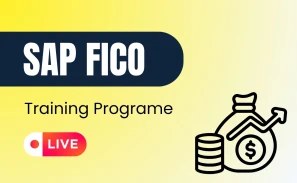SAP FSCD: Managing Financial Services with Enhanced Control
SAP FSCD Training || SAP FSCD certification Training || SAP FSCD Online training || SAP FSCD self-paced training || SAP FSCD Instructor-Led training
Key Features of Training:
- 30 Hrs Instructor-led Training
- Mock Interview Session
- Project Work & Exercises
- Flexible Schedule
- 24 x 7 Lifetime Support & Access
- Certification and Job Assistance
SAP FSCD(Financial Services in Collections and Disbursements):
SAP FSCD (Financial Services in Collections and Disbursements) is a comprehensive software solution designed for financial service organizations, such as insurance companies and banks, to streamline their collections and disbursement processes. It enables efficient management of financial transactions related to insurance premiums, claims, and policyholder payments. FSCD offers functionalities for debt collection, payment processing, policy administration, and accounting, helping organizations improve their cash flow, reduce delinquencies, and enhance customer service. With its integration capabilities and real-time reporting, FSCD provides better visibility into financial operations, compliance, and risk management, making it a valuable tool for optimizing financial services within complex regulatory environments.
Prerequisites: Who can attend SAP FSCD Training?
- Finance Professionals
- SAP Users
- IT Professionals
- Business Analysts
- Consultants
- Good Communication Skills.
Responsibilities of SAP FSCD Consultant:
- Requirement Analysis
- System Implementation
- Configuration
- Integration
- Customization
- Testing
Course Benefits:
- Job opportunities:
- Promotion opportunities (Salary Hike):
- Increased productivity:
- Improved decision-making
- Gain in-demand skills
What is the future of SAP FSCD Consultant?
- Continued Demand for Financial Software
- Digital Transformation
- Regulatory Compliance
- Data Analytics and Insights
- Cloud Adoption
The fee for SAP FSCD(Financial Services in Collections and Disbursements) training can vary depending on several factors such as the location, duration of the course, training format, and level of expertise. SAP offers various training options for FSCD, including instructor-led courses, e-learning courses, and virtual live classrooms.
For More details you can Register Sign Up
SAP FSCD(Financial Services in Collections and Disbursements) Certification FAQ's:
1. What is SAP FSCD Certification?
A: SAP FSCD Certification is a validation of your expertise and knowledge in SAP's Financial Services in Collections and Disbursements (FSCD) module. It demonstrates your ability to configure, implement, and manage financial processes within this specific SAP module.
2. Why should I get certified in SAP FSCD?
A: Getting certified in SAP FSCD can be beneficial for your career in the field of SAP and finance. It helps you stand out as a qualified professional in FSCD implementation and configuration, which can lead to better job opportunities and higher earning potential.
3. What are the prerequisites for SAP FSCD Certification?
A: The prerequisites for SAP FSCD Certification can vary depending on the specific certification level and type. Typically, you would need some level of experience in SAP FSCD and should have completed relevant training courses. SAP often provides specific prerequisites for each certification exam on their website.
4. How can I prepare for SAP FSCD Certification exams?
A: Preparation for SAP FSCD Certification exams usually involves a combination of studying official SAP training materials, taking online or in-person training courses, and practicing with hands-on experience in FSCD implementation. You can also use SAP documentation, books, and online forums to supplement your knowledge.
5. Where can I take the SAP FSCD Certification exams?
A: You can take SAP FSCD Certification exams at authorized SAP Certification Centers, which are located in various cities around the world. SAP's official website provides information on the nearest certification centers and how to register for an exam.
6. What types of SAP FSCD Certification are available?
A: SAP offers various levels and types of FSCD certifications, such as Associate, Professional, and Specialist certifications. The specific certifications available can change over time, so it's essential to check SAP's official certification webpage for the most up-to-date information.
7. How much does SAP FSCD Certification cost?
A: The cost of SAP FSCD Certification exams can vary depending on the type and level of certification you are pursuing. SAP provides pricing information on their official website. Be sure to check the current pricing before registering for an exam.
8. How long is an SAP FSCD Certification valid?
A: SAP certifications are typically valid for two years. After that period, you may need to renew your certification by passing a recertification exam or by meeting other renewal requirements specified by SAP.
9. What is the format of SAP FSCD Certification exams?
A: SAP FSCD Certification exams typically consist of multiple-choice questions, scenario-based questions, and hands-on exercises that test your practical knowledge of FSCD implementation and configuration.
10. How can I maintain my SAP FSCD Certification?
A: To maintain your SAP FSCD Certification, you will need to participate in SAP's Continuing Learning program and complete the required number of Continuing Learning Points (CLPs) during your certification's validity period. This demonstrates that you are staying up-to-date with the latest developments in FSCD and SAP technologies.
SAP FSCD(Financial Services in Collections and Disbursements) Certification:
SAP Financial Services in Collections and Disbursements (FSCD). Please note that certification offerings and details may change over time, so I recommend visiting the official SAP website or contacting SAP directly for the most current information. However, here's a general overview of SAP FSCD Certification:
SAP FSCD Certification Overview:
Certification Levels: SAP typically offers different certification levels, including Associate, Professional, and Specialist, depending on the complexity and depth of knowledge required for each level.
Prerequisites: Prerequisites for SAP FSCD Certification may include a combination of relevant training courses, practical experience in SAP FSCD, and a foundational understanding of SAP's financial solutions.
Training: SAP provides training materials and courses to help candidates prepare for FSCD Certification exams. These courses cover various aspects of SAP FSCD, including configuration, implementation, and usage.
Exam Format: The certification exams often consist of multiple-choice questions and scenario-based questions designed to assess your knowledge and skills related to SAP FSCD.
Exam Registration: You can register for SAP certification exams through authorized SAP Certification Centers, which are located worldwide. Check the SAP website for information on exam schedules and registration.
Cost: There is usually a fee associated with taking SAP certification exams. The cost may vary depending on the certification level and location. SAP provides pricing details on their website.
Validity: SAP certifications are typically valid for two years. After this period, you may need to renew your certification by passing a recertification exam or meeting other renewal requirements.
Continuing Education: SAP encourages certified professionals to participate in their Continuing Learning program to stay up-to-date with the latest developments in SAP technology and solutions.
Benefits: Achieving SAP FSCD Certification can enhance your career prospects, increase your market value as an SAP professional, and demonstrate your expertise in managing financial services in collections and disbursements using SAP solutions.
SAP FSCD(Financial Services in Collections and Disbursements) Curriculum:
Introduction to SAP S/4HANA:
- Overview of SAP S/4HANA and its benefits.
- Understanding the architecture and components of SAP S/4HANA
SAP FSCD Overview:
- Introduction to SAP FSCD and its role in financial services.
- Key features and functionalities of SAP FSCD in SAP S/4HANA
Organizational Structure:
- Configuring organizational units in SAP S/4HANA for FSCD.
- Defining organizational hierarchies and relationships.
Master Data Management:
- Managing customer master data.
- Handling contract and policy data.
- Product and service master data management.
Collections Management:
- Configuring and using collections worklists.
- Strategies for collections and dunning.
- Monitoring and reporting on collections activities.
Disbursements Management
- Configuring payment methods and disbursement processes.
- Managing vendor and payment master data.
- Processing payments to policyholders and vendors.
Capacity Planning
- Setting up the Interaction Center for customer service.
- Handling customer inquiries and requests.
- Managing service requests and cases.
Regulatory Compliance
- Understanding and implementing regulatory compliance requirements.
- Managing compliance reporting.
Reporting and Analytics
- Overview of reporting tools in SAP S/4HANA.
- Creating custom reports and dashboards for FSCD.
Integration with Other SAP Modules
- Integrating SAP FSCD with SAP FI (Financial Accounting) and SAP CO (Controlling).
- Understanding data flow and consistency across modules.
Customization and Enhancement
- Customizing SAP FSCD to meet specific business requirements.
- Enhancing FSCD functionalities through SAP's development tools.
Testing and Troubleshooting
- Strategies for testing SAP FSCD configurations and processes.
- Troubleshooting common issues and errors.
SAP FSCD(Financial Services in Collections and Disbursements) Interview Questions and Answers:
1. What is SAP FSCD, and why is it important in the financial services industry?
Answer: SAP FSCD stands for Financial Services in Collections and Disbursements. It is important in the financial services industry because it helps organizations manage financial transactions related to insurance policies, loans, and collections effectively.
2. What are the key components of SAP FSCD?
Answer: The key components of SAP FSCD include Policy Management, Billing and Invoicing, Collections Management, Disbursements, and Integration.
3. What is a Collection Strategy in SAP FSCD, and how is it configured?
Answer: A Collection Strategy is a set of rules and actions used to manage collections. It can be configured in SAP FSCD to define how overdue payments are handled, including dunning levels, interest calculations, and collection letters.
4. How does SAP FSCD integrate with other SAP modules like SAP FI (Financial Accounting)?
Answer: SAP FSCD integrates with SAP FI to ensure that financial data flows seamlessly between the two modules. This integration allows for accurate general ledger accounting and financial reporting.
5. What is a Billing Document in SAP FSCD, and what information does it contain?
Answer: A Billing Document in SAP FSCD is a record of a financial transaction generated during the billing process. It contains information about the policyholder, the billed amount, due dates, and payment methods.
6. Explain the concept of Payment Allocation in SAP FSCD.
Answer: Payment Allocation in SAP FSCD is the process of applying received payments to outstanding invoices or policy premiums. It ensures that payments are allocated correctly to maintain accurate account balances.
7. How can you configure installment plans for policy premiums in SAP FSCD?
Answer: Installment plans for policy premiums can be configured in SAP FSCD by defining the installment frequency, due dates, and installment amounts based on the policy terms and conditions.
8. What is a Dunning Letter, and how can you configure dunning processes in SAP FSCD?
Answer: A Dunning Letter is a notification sent to customers with overdue payments. Dunning processes in SAP FSCD can be configured by defining dunning levels, dunning procedures, and assigning them to customer accounts.
9. How does SAP FSCD handle regulatory compliance requirements in the financial services industry?
Answer: SAP FSCD provides features to help organizations comply with regulatory requirements by generating necessary reports, maintaining audit trails, and ensuring data accuracy.
10. What is the significance of Data Migration in SAP FSCD projects, and how is it typically executed?
Answer: Data Migration is critical in SAP FSCD projects to transfer existing customer and financial data from legacy systems. It involves data extraction, transformation, and loading (ETL) processes to ensure data accuracy.
11. Explain the importance of User Training in SAP FSCD implementations.
Answer: User Training is crucial to ensure that employees can effectively use SAP FSCD. Training helps users understand new processes, navigate the system, and perform their tasks efficiently.
12. What types of testing are typically performed during an SAP FSCD implementation project?
Answer: Various types of testing are conducted, including Unit Testing, Integration Testing, User Acceptance Testing (UAT), and Regression Testing, to ensure the system functions as expected.
13. How does SAP FSCD support Disbursements and Claims processing?
Answer: SAP FSCD supports Disbursements and Claims processing by allowing organizations to set up payment approval workflows and manage the disbursement of funds to policyholders or claimants.
14. What is the role of Key Performance Indicators (KPIs) in SAP FSCD reporting?
Answer: KPIs in SAP FSCD reporting are metrics used to measure the performance and effectiveness of financial processes. They help organizations monitor and optimize their collections and disbursements activities.
15. How can SAP FSCD help organizations improve customer service in the financial services sector?
Answer: SAP FSCD can improve customer service by providing accurate billing, timely communication through dunning letters, and efficient handling of customer inquiries related to their policies or accounts.
16. What is a Payment Lot in SAP FSCD, and how is it used in payment processing?
Answer: A Payment Lot in SAP FSCD is a grouping of payments received from customers. It is used to efficiently process and allocate multiple payments to corresponding invoices or accounts.
17. Can you explain the concept of Interest Calculation in SAP FSCD?
Answer: Interest Calculation in SAP FSCD is the process of determining and applying interest charges to overdue amounts. It is configured based on predefined rules, interest rates, and calculation methods.
18. How does SAP FSCD handle multi-currency transactions, especially in the context of international financial services?
Answer: SAP FSCD supports multi-currency transactions by allowing organizations to define exchange rates and manage transactions in different currencies, ensuring accurate accounting and reporting for international operations.
19. What is the significance of Credit Management in SAP FSCD, and how is it configured?
Answer: Credit Management in SAP FSCD is important for assessing a customer's creditworthiness and setting credit limits. It is configured by defining credit rules, credit categories, and credit limits for customers.
20. Explain the concept of Clearing in SAP FSCD.
Answer: Clearing in SAP FSCD refers to the process of reconciling and settling open items between customer accounts and invoices, ensuring that payments are matched with the correct outstanding amounts.
21. How can SAP FSCD be integrated with external systems, such as policy administration systems or banking systems?
Answer: SAP FSCD can be integrated with external systems through various methods, including file-based interfaces, web services, and application programming interfaces (APIs), to exchange data and transactions seamlessly.
22. What is the role of Business Partner Master Data in SAP FSCD, and how is it managed?
Answer: Business Partner Master Data in SAP FSCD contains information about customers and counterparties. It is managed by creating and maintaining business partner records, which include contact details, identification data, and relationship information.
23. How does SAP FSCD handle disputes and adjustments in financial transactions?
Answer: SAP FSCD provides functionality to manage disputes and adjustments by allowing users to record and track disputed amounts, initiate resolution processes, and make necessary adjustments to customer accounts.
24. What are some common challenges that organizations may face during the implementation of SAP FSCD, and how can they be mitigated?
Answer: Common challenges include data migration issues, complex regulatory requirements, and user adoption. These challenges can be mitigated through careful planning, thorough testing, and comprehensive training programs.
25. How does SAP FSCD support automated communication with customers, such as sending notifications or reminders?
Answer: SAP FSCD supports automated communication with customers through the generation of dunning letters, billing statements, and other customer correspondence based on predefined templates and triggers.
26. What is the role of a Business Partner Role Category in SAP FSCD, and how is it assigned?
Answer: A Business Partner Role Category in SAP FSCD defines the role or function of a business partner, such as policyholder, payer, or intermediary. It is assigned to business partners to specify their roles in financial transactions.
27. How can organizations use SAP FSCD for forecasting and cash flow management?
Answer: SAP FSCD can be used for forecasting by providing real-time visibility into receivables and payables, allowing organizations to better manage cash flow and liquidity.
28. What are some best practices for ensuring the security of financial data in SAP FSCD?
Answer: Best practices include role-based access control, data encryption, regular security audits, and compliance with data protection regulations to safeguard financial data.
29. Can you explain the concept of Business Partner Relationships in SAP FSCD?
Answer: Business Partner Relationships in SAP FSCD define the connections between different business partners, such as policyholders and agents. They are used to establish relationships and associations between parties involved in financial transactions.
30. What is the role of a Payment Run in SAP FSCD, and how is it executed?
Answer: A Payment Run in SAP FSCD is a process that generates and processes outgoing payments to vendors or policyholders. It is executed based on defined payment methods, due dates, and payment criteria.
Participants will have 24/7 access to our online lab, providing hands-on experience with SAP FSCD tools and scenarios.
This includes server access to S/4 HANA 2023 for 1 year, ensuring you have ample time to practice and apply your skills in a real-world environment.
With this extended access, you can work on projects, explore advanced features, and solidify your understanding of SAP FSCD in the latest SAP S/4 HANA version.














